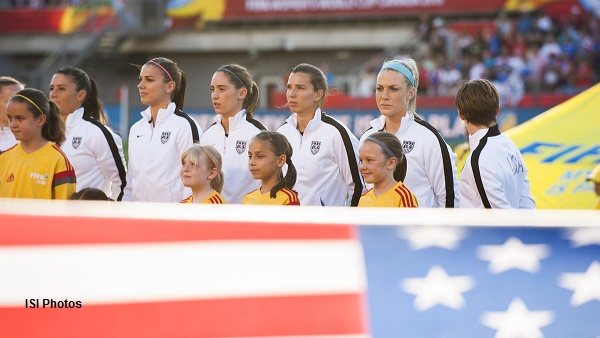It’s not about the revenue: Shawhan on USSF vs. USWNT

In the wake of the U.S. Women’s National Team filing a gender-discrimination complaint with the Equal Employment Opportunity Commission, one idea, in particular, has dominated the response from the U.S. Soccer Federation and its defenders: revenue.
The players of the U.S. Men’s National Team bring in more revenue for U.S. Soccer than the USWNT, the argument goes, so it’s only fair they get paid more, too.
USSF president Sunil Gulati, when asked if he believes the USWNT deserves to be paid the same as the USMNT, responded, “I don’t want to use the word deserve in any of this.” Instead, he prefers to “reverse the question: Do you think revenue should matter at all in determination of compensation in a market economy?”
+READ: U.S. Soccer releases statement on USWNT wage discrimination complaint
In this case? No, no I don’t.
To start with, USSF, as the only FIFA-recognized governing body of soccer in the United States, isn’t in a market economy, in the relevant sense. It is instead far more akin to a regulated public utility — making its operating decisions in the interests of the sport of soccer in this country, rather than on market incentives created by the threat of competition. (And, by definition, it is basically the only game in town for U.S. players who want to compete at the international level, with all the market-distorting effects that implies.)
Even if USSF were operating in a competitive market, though, that wouldn’t necessarily require the link between revenue and compensation that Gulati et al. are relying on. There are lots of ways to run a business, and lots of ways to determine employee compensation. Which one’s a business chooses depends, among other things on the nature of the business, its goals, and its culture.
 These factors might call for varying how much employees get paid based on how much revenue they bring in. On the other hand, they might not. Selecting among compensation structures is a choice about organizational values and priorities.
These factors might call for varying how much employees get paid based on how much revenue they bring in. On the other hand, they might not. Selecting among compensation structures is a choice about organizational values and priorities.
Fundamentally, then, Gulati’s answer is a cop-out. Basing player pay on the revenue they bring in itself reflects a conclusion about what players “deserve” to be paid. That is, for USSF, what players deserve varies based on how much other people (fans, advertisers, apparel companies and so on) value them, monetarily speaking. Never mind that the respective value placed on men’s and women’s soccer has been (and continues to be) heavily influenced by sexism — if external actors think female players are worth less than male players, well then, the national federation will treat the women as worth less than the men too.
+READ: U.S. Soccer releases annual budget figures; reveals USWNT as cash cow
The federation has carefully avoided saying that it can’t sustainably pay the WNT and MNT equally. It just doesn’t think it should have to.
But from where I sit, that approach simply can’t be reconciled with the nature of USSF as an organization. USSF’s mission is to further all soccer in the United States: women’s soccer, just as much as men’s. That requires valuing men’s and women’s soccer, and the men’s and women’s national teams, equally — not delegating that decision to others and then ratifying their view that women are less valuable.
 The members of the MNT and WNT all play matches against other national teams, wearing uniforms that say USA? OK, then. They should all get paid equally. And yes, translating that principle into practice is often going to be complicated, and sometimes imperfect. Doesn’t mean you junk the principle.
The members of the MNT and WNT all play matches against other national teams, wearing uniforms that say USA? OK, then. They should all get paid equally. And yes, translating that principle into practice is often going to be complicated, and sometimes imperfect. Doesn’t mean you junk the principle.
The broader point, though, is simply that this is a choice among organizing principles. The WNT has one basic view of how to determine what national-team players deserve in compensation. USSF has another.
Gulati et al. should not be able to glide past the fact that they’ve made a choice by gesturing to shibboleths about market forces. And if they don’t feel that they can openly defend their chosen principle on the merits, that alone says a great deal.
SOCCERWIRE MARKETPLACE
- visitRaleigh.com Showcase Series 2025, hosted by NCFC Youth
- OFFICIAL MANCHESTER CITY SOCCER CAMPS
- Wanted Licensed Youth Soccer Coach
- Join Official Elite Summer Soccer Camps with Europe’s Top Pro Clubs!
- The St. James FC Travel Staff Coach - North (Loudoun) & South (Fairfax)
- The St. James FC Girls Academy (GA) Head Coach - 2 teams
- The St James FC Boys Travel Tryouts
- OFFICIAL BAYERN MUNICH SUMMER CAMPS U.S.
- JOIN THE ALLIANCE!
- OFFICIAL FC BARCELONA CAMPS U.S.











